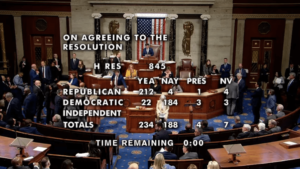WASHINGTON, D.C. – The U.S. House of Representatives voted to censure Michigan’s Democratic Rep. Rashida Tlaib as she continued to defend comments falsely considered as calling for Jewish elimination and described as anti-Semitic.
Twenty-two Democrats joined Republicans in a 234-188 vote late Tuesday, after Tlaib — the only Palestinian American member of Congress — posted a video of Michigan protesters chanting “from the river to the sea”, part of a chant condemned by Jewish groups and the Anti-Defamation League as anti-Semitic.
But what does it mean to be censured in the House of Representatives and what effect does it have?
A censure, according to the U.S. House, is a form of rebuke that “registers the House’s deep disapproval of member misconduct that, nevertheless, does not meet the threshold for expulsion.”
Generally, a censure is a condemnation of a member’s actions, statements or a combination of the two. It requires only a majority of members of the House to pass.
Upon approval by the majority, the censured lawmaker is supposed to stand in the well of the House chamber while the presiding officer reads the censure resolution. Tlaib was not required to stand in the well.
A censure is viewed as more serious than a “reprimand”, which is another resolution House members can bring to the floor to punish fellow members.
A censure doesn’t result in the removal of a member from any committees or hamper his or her authority as a lawmaker in any way. Twenty-six members have been censured in the history of the House.
The rare vote found a problem with the Democratic representative’s embrace of the slogan “From the river to the sea, Palestine will be free” – a pro-Palestine chant that has drawn scrutiny from Israel and its Zionist supporters in the West.

They claim falsely that the slogan “is widely recognized as a genocidal call to violence to destroy the state of Israel and its people.”
Tlaib has defended the slogan, saying it was an “aspirational call for freedom… and peaceful existence and not death, destruction and hate.”
During the debate she and her progressive colleagues in the House reiterated a call for a ceasefire as the Israeli military offensive has killed more than 10,000 Palestinians, many of them children, in one month.
“Palestinian people are not disposable,” an emotional Tlaib said.
Tlaib has been a vocal critic of the Israeli government for its treatment of Palestinians and had previously called for an end to Washington’s aid for Israel, including $3.8 billion in annual military assistance.
She has lambasted the Israeli bombardment of Gaza that has overwhelmingly killed civilians, but she has also repeatedly condemned the deadly attack by Hamas.
She said her criticism has always been directed toward the government of Israel and its leadership under Prime Minister Benjamin Netanyahu, not against Jewish people.
“The idea that criticizing the government of Israel is anti-Semitic sets a very dangerous precedent,” she said. “And it’s been used to silence diverse voices speaking up for human rights across our nation.”
Tuesday’s vote against Tlaib comes as the U.S. right wing, including many members of the Congress, have used inflammatory language against Palestinians in the wake of the Hamas attack. As Israel launched its war on Gaza on October 7, Representative Max Miller (R-OH) called for the laws of war be swept aside while Senator Lindsey Graham (R- S.C.) said Gaza should be “flattened.”
U.S. Rep. Jamie Raskin (D-MD), who defended Tlaib, said the resolution degrades the U.S. Constitution and “cheapens the meaning of discipline in this body for people who actually commit wrongful actions like bribery, fraud, violent assault and so on.”
The 47-year-old politician and lawyer is a three-term Democratic representative and currently serves as the representative for Michigan’s 12th Congressional District, which includes large number of Ara and Muslim Americans.
She is the first woman of Palestinian descent in Congress.






Leave a Reply